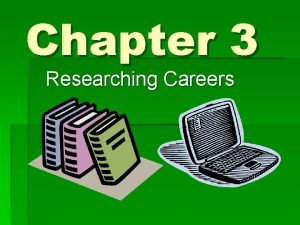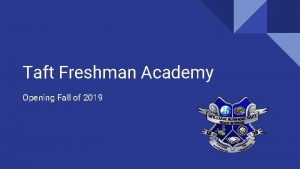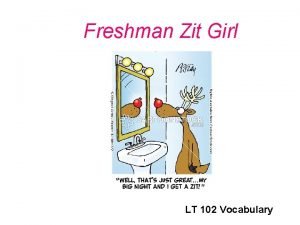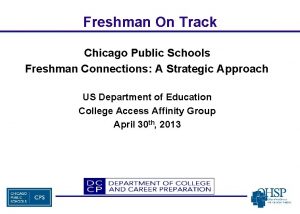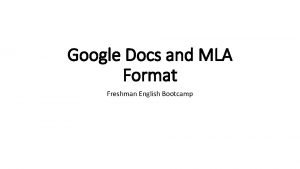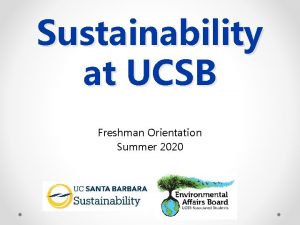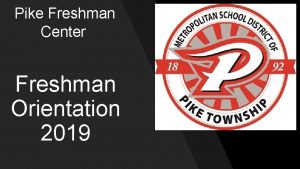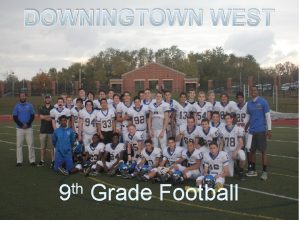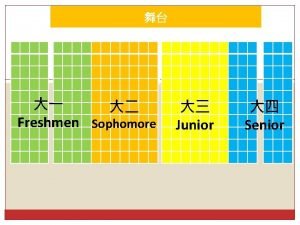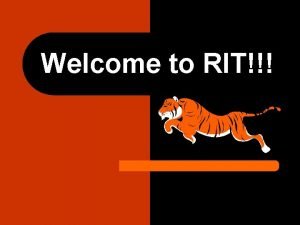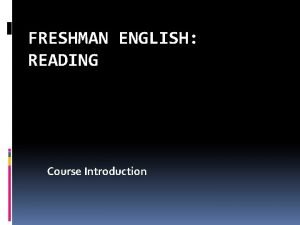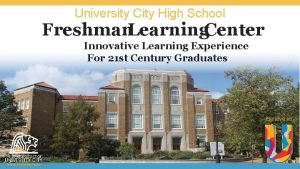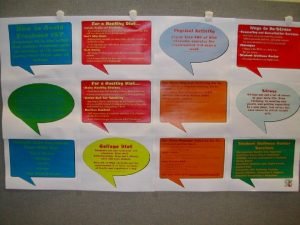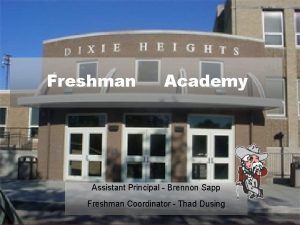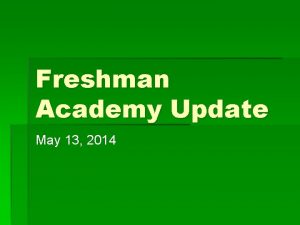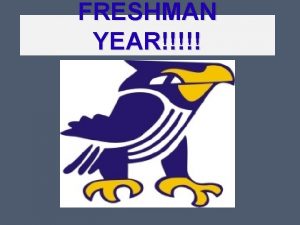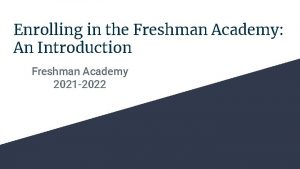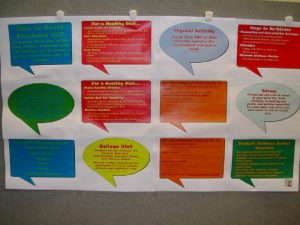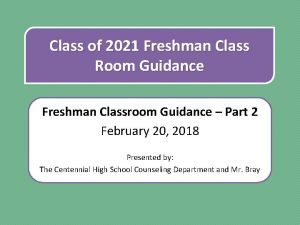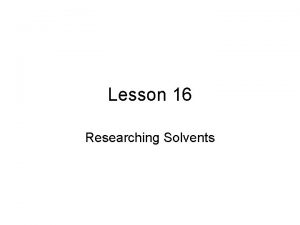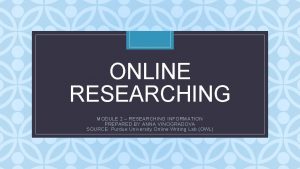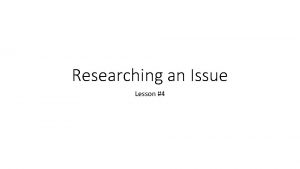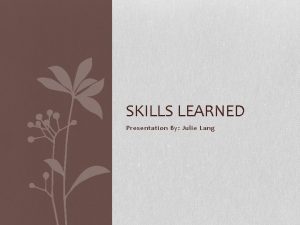Researching History A Guide for Freshman Researching Researching























- Slides: 23

Researching History A Guide for Freshman

Researching • Researching is essentially finding information on a topic.

• When you research, you seek to answer a specific question or learn about an aspect of a topic.

• Research can be a long, difficult process if your topic is too broad, so be sure to narrow your topic. For example: - World War II [Too broad of a topic] - Technology in WWII [Too broad of a topic] - The Development of V-1 & V-2 Rockets in World War II [Acceptable topic] - The Experience of Children in the Warsaw Ghetto [Acceptable topic]

• After choosing a topic, you must find resources.

How to Find Resources • • Resources are not difficult to find. For a history topic, using an encyclopedia to obtain background information is a good starting point. The encyclopedia can be an online encyclopedia. All print encyclopedias and some online encyclopedias will have a section entitled “For Further Reading” or “Additional Resources” or “Recommended Reading” at the end of an encyclopedia entry, which may have sources that are relevant to your research topic. In addition to an encyclopedia, you can use your school textbook for background information.

• • • After consulting an encyclopedia and/or textbook, a trip to your school library and local public library branch is recommended. All libraries have online catalogues of the resources in their library. Some libraries, such as the New York Public Library, have very sophisticated search capabilities on their websites that will allow you to narrow down books to the most relevant books on your topic. • • ASK THE LIBRARIAN OF THE LIBRARY YOU ARE IN FOR ASSISTANCE IN SEARCHING FOR BOOKS! Librarians are there to help library patrons, so do not be afraid to ask for assistance. Remember, if the library branch you visit does not have the book you desire for your project but another branch does, you can request that it be sent to your branch.

Libraries • All public libraries have websites with access to their catalogues and information on their branches. • New York Public Library • www. nypl. org • Brooklyn Public Library • www. brooklynpubliclibrary. org • Queens Public Library • www. queenslibrary. org

Index Cards • • Index cards are your best friend when researching. Books have many pages and all of those pages will not be of use to your research topic, so write down the page numbers of the pages you plan to use in your research on the lined side of the index card. Next to each page number, write the part of the topic that page will help you to describe. On the blank side, write the citation: Author’s Last Name, Author’s First Name. Book Title. Publication City: • Publisher, Copyright Year.

• • • Similarly, websites are a fantastic tool for researching information. You do not cite search engines such as Google and Bing. You only cite the actual website with information on your topic. On the index cards, write down the paragraphs in the text of a website that you plan to use in your research on the lined side of the index card. Next to each page number, write the part of the topic that page will help you to describe. On the blank side, write the citation, which should include: • • • The Name of the author, compiler, director, editor, narrator, performer, or translator of the work. The Title of the Work The Title of the Website Edition [if applicable] Publisher or sponsor of the website [if applicable. if not, write N. p. ] Date of publication [day, month, and year if available. if not, write n. d. ] Web as the type of publication The Date you visited the website [day, month, and year] Website URL [the direct link] in between < >.

MLA Manual of Style • Use the MLA Manual of Style for the proper citation formating of resources.

Keep your index cards wrapped in a rubber band in a safe, dry, and convenient place.

How many sources should you have? • For a 5 page research paper, you should have AT LEAST five sources [not including an encyclopedia or textbook]. • Ultimately, the number of sources is not as important as the quality of sources.

Books • • • Generally speaking, printed books are of excellent quality. With regards to history, look for books published by university presses or reputable publishers, such as Harper-Collins, Little Brown and Company, Macmillan, Scholastic, Harcourt, Glencoe, Prentice Hall, St. Mark’s Press, Picador, Vintage, Pengiun, Bantam, Norton, & Simon and Schuster. Additionally, books should not be historical fiction as it is not a true rendering of events.

Magazines • • Magazines are of varying quality; however, the following magazines are acceptable for research in my history course: • • • Smithsonian Time American Heritage National Geographic New York Times Magazine Newsweek The following magazines are acceptable for topics related to fashion or entertainment: • • • Rolling Stone Magazine Spin Vogue GQ Harper’s Bazaar

Websites • • Websites range from superb to terrible with regards to quality. . net, . biz, and. info are not permitted to be used in research papers assigned in my class. The preferred websites are from. edu, . org, and. gov websites as these are educational institutions, organizations, and United States government websites respectively. . com websites may be used ONLY with my permission. • The reason for the restriction placed on. com websites is because. com websites belong to companies, some of which have sketchy credentials.

Newspapers • • Sadly, the number and quality of newspapers in the United States has greatly declined in recent years; however, newspapers are an excellent source of information. The following newspapers are among the highest circulating papers in the United States: • • • The New York Times Chicago Tribune The Wall Street Journal Los Angeles Times San Francisco Chronicle Houston Chronicle The Philadelphia Inquirer The Washington Post USA Today Newsday The following local papers are quite informative: • The NY Daily News • Brooklyn Eagle • The Brooklyn Spectator • Staten Island Advance • Village Voice • New York Observer • Queens Tribune

Google Advanced Search • Google is the greatest for finding information; however, to properly research you must use the advanced search feature. • • • Why? Using the standard search bar will produce millions of results, the equivalent of walking into a library and checking out every book. The advanced search feature produces a more manageable number of results.


A Sample Advanced Search

• • You may have noticed that the reading level chosen was “only display immediate level. ” By setting a reading level, I ensured that the results would not be too difficult for a high school freshman. The key is to make your search as specific as possible, which I did by asking google to search for Hammurabi [under all these words], Hammurabi’s Code [under this exact wording or phrase], and Babylon [under one or more of these words].

Go and Write • Once you finish researching information, sort your index cards according to what part of the topic they explain. • • • For example, if you are researching the effects of Hammurabi’s Code, you might want to have the index cards divided into three categories: 1. information on Hammurabi; 2. examples of the code’s laws, and; 3. reactions of Babylonians to the laws. After sorting your index cards, create an outline of your paper. Once the outline is complete, begin writing. An “A” paper is a paper that has been through many drafts before deciding upon a final copy, so do not simply write the paper and turn it in.

Sample Outline • • I. Introduction A. Introductory/Topic Sentence B. Thesis Statement II. Body Paragraph 1 A. Main Idea 1 B. Supporting Idea/Analysis #1 C. Supporting Idea/Analysis #2 D. Supporting Idea/Analysis #3 E. Supporting Idea/Analysis #4 III. Body Paragraph II A. Main Idea 2 B. Supporting Idea/Analysis #1 C. Supporting Idea/Analysis #2 D. Supporting Idea/Analysis #3 E. Supporting Idea/Analysis #4 IV. Body Paragraph IV A. Main Idea 3 B. Supporting Idea/Analysis #1 C. Supporting Idea/Analysis #2 D. Supporting Idea/Analysis #3 E. Supporting Idea/Analysis #4 • • • • • V. Conclusion • Restatement of thesis statement • Summary Sentence 1 • Summary Sentence 2 • Summary Sentence 3 VI. Works Cited • Attach a draft works cited page to the outline.
 Chapter 3 researching careers
Chapter 3 researching careers Wan concepts
Wan concepts Researching
Researching Researching the corruption
Researching the corruption Bssd powerschool
Bssd powerschool Carmel freshman center
Carmel freshman center Taft freshman academy
Taft freshman academy Zit girl
Zit girl Cps freshman connection
Cps freshman connection Ferguson hall freshman school
Ferguson hall freshman school How to do mla format on docs
How to do mla format on docs Counter argument paragraph example
Counter argument paragraph example Ucsb freshman orientation
Ucsb freshman orientation Pike high school freshman center
Pike high school freshman center Downingtown west freshman football
Downingtown west freshman football High school freshman orientation agenda
High school freshman orientation agenda Dvhs counselors
Dvhs counselors Naviance northwood high school
Naviance northwood high school Senior freshman junior
Senior freshman junior Rit withdraw from class
Rit withdraw from class English fresh man course
English fresh man course Freshman learning center
Freshman learning center Real-time walkthrough
Real-time walkthrough Fspos
Fspos
